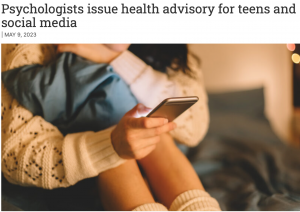
From the Senate Judiciary Committee to NPR, a national discussion has focused on the problems of teens & social media. Two therapists are offering solutions:
— Dr. Robert Keane & Kam Mendes
WASHINGTON, DC, USA, May 18, 2023/EINPresswire.com/ — It’s hightime we have a national sit-down about social media. With May being mental health awareness month and groundbreaking legislation before Congress to prevent children under 13 from using social media, we want parents to know: You don’t have to wait for an act of Congress to help your child curb their dependence on social media.
We have seen the effect of excessive social media use through our work with adolescents at a Massachusetts-based psychiatric hospital. Based on these observations, we developed a novel theory that social media appeared to change how our patients perceived happiness. We posit that within the context of isolation during the pandemic, excessive social media use presented a distorted view of the world by creating the perception that everyone on their feed was exuberantly happy. Further, when it seemed like everyone else was happy and I know I was not, feelings of depression, diminished self-worth and anxiety soon follow.
It surprised us to hear that most of the adolescents in our daily therapy group were using social media for double-digit hours each day; and over half articulated a relationship between their mental health and the messaging they receive through social media. To our greater surprise, all but one felt there was a need for some kind of external controls. They could not imagine decreasing their usage all by themselves. For our group of hospitalized adolescents, the dynamic is clear to us; the high amount of scrolling created a distortion about the lives they believed their peers are living and resulted in negative internalized judgments about how their own lives compared—and they can’t stop.
The question for parents – and society – becomes how do we help our adolescents move away from using social media as the most dominant form of peer interaction and restore the glue of genuine human connection?
We hear from exasperated parents who blame themselves for letting their adolescent’s overreliance on their devices go unnoticed and not intervening along the way. We hear about reacting, perhaps a bit too late and often out of frustration, with an authoritarian all-or-nothing approach; taking away their child’s device or installing content trackers to see their every swipe.
What is a parent to do? Here are our “Top 5” recommendations:
1. Our first recommendation is to overcome your feelings of guilt. Trust us when we say it’s not your fault. The explosive growth of social media was like a speeding train; there was no time to anticipate its power nor opportunity for a thoughtful response.
2. Second, it is important that you become aware of your own relationship to a device. As your adolescent may point out, it’s not okay to preach one thing and do another. We suggest you try to develop “an observing ego” which is to notice your own behavior as objectively as possible. For example, part of a therapist’s training is about time management, like placing a clock on the wall behind the client so they do not notice when you check it. But the truth is, whenever a therapist does glance at the clock, the client likely does notice. And with that quick glance comes a strong message: I am not focusing on you. The same truth holds for devices. Whenever you check your device, even for a moment, you are communicating to your child.
3. Third, make reasonable family rules. The addictive component of social media can be managed with rules similar to how we sometimes moderate other things in our lives, like alcohol or food. Some examples include agreeing as a family that no one will use their device during dinner, or that devices stay on the kitchen counter overnight rather than in a bedroom, or maybe not using your device when watching a family movie, “Only one screen on at a time”. With some thought and creativity, it is possible to implement effective and enforceable family rules without feeling like a dictator.
4. Fourth, don’t miss the opportunity to talk with your child about what they’re seeing on social media. Remember, these devices are a generational change in how people engage with the world. Whereas we grew up reading the newspaper, listening to the radio, or watching cable news, most adolescents today receive information about important social issues through their device. Join with them. Be curious and ask about what they are seeing and learning.
5. Lastly, look for opportunities with your adolescent to think about what is behind their reliance on a device. Many of the adolescents we’ve worked with who struggle with anxiety and depression and tell us that social media is a convenient tool that can help them.
With our future trending towards a more virtual world, the stakes to better manage our relationship to social media have never been higher. Despite its benefits, it is important to acknowledge the unintended consequences this unfettered access to information has had on our young people. And we feel the time to act is now. We urge parents to realize that there won’t be a superhero to save our children at the end of this story. It will need to be you.
B Keane
+1 202-674-7509
[email protected]
![]()
Originally published at https://www.einpresswire.com/article/633384692/the-tiktok-treatment-a-therapist-s-open-letter-to-parents-you-are-not-powerless-when-it-comes-to-social-media






